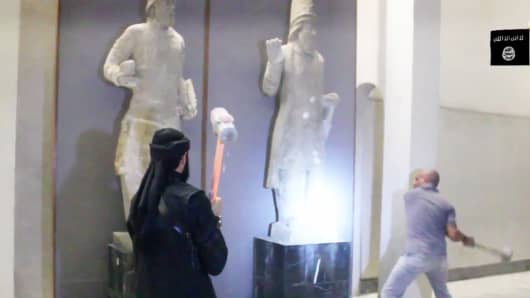What the U.S. needs now is an immediate plan to turn the tide against ISIS. It should involve three key pillars: defining the adversary, implementing a coherent plan to counter propaganda, and supporting local forces readying to retake Mosul.
Defining the adversary
Washington is reluctant to use the term "Islamic extremists." It tiptoes around Muslim sensibilities, believing that the term typecasts all Muslims as violent and radical.
The exact opposite is true. Using the term differentiates between Muslims who use Islamic teachings to justify sensational violence and those who follow a path of peace and tolerance.
Read MoreBBC names 'Jihadi John'
By failing to distinguish between good Muslims and Islamic extremists, Washington invites charges of a crusade against the broader Muslim community. Muslims want to distinguish those who abuse the Prophet's teachings from the vast majority of Muslims who are peace-loving.
The Obama administration should stop debating terminology. Using the term Islamic extremists gives a choice to Muslims: Uphold the noble values of Islam or align with the ISIS criminal gang. ISIS will be defeated when Sunni Muslims repudiate the Islamic State.
Countering propaganda
ISIS generates as many as 90,000 tweets and other social media posts a day. Its slick videos document atrocities committed against Muslims around the world.
The Obama administration established the Center for Strategic Counterterrorism Communications as an inter-agency focal point in 2011. Its Digital Outreach Team is mandated to engage in Arabic, Urdu, Punjabi, and Somali to counter terrorist propaganda, including narratives that influence those susceptible to radicalization and recruitment.
Read MoreFear grows in Europe as ISIS comes to Libya
The digital response to ISIS has been nothing less than pathetic. The Center's budget is only about $5 million a year. Washington cannot counter the ISIS social media campaign on a shoestring. It should appoint proactive leadership, and provide resources so the center can be more effective.
Washington must also consider U.S. policies that ISIS manipulates to galvanize Muslim rage. For example, the Guantanamo Bay detention center is a recruiting bonanza. The U.S. can spend more money on messaging, but sophisticated marketing cannot put lipstick on a pig.
Winning on the battlefield
Of course, building a better web site will not defeat ISIS.
The fight against ISIS will be won the battlefield. Yet, U.S. security assistance has been sluggish at best. Airstrikes have been slow and selective. Efforts to train and equip local forces have been too lackadaisical.
Read MoreHow the US and Iran could become BFFs
The U.S. provides Kurdish peshmerga with light and medium defensive weapons. But machine guns and bullets won't defeat ISIS, which is well-equipped with weapons it seized from the Iraqi army. Kurds need tanks and artillery to level the battlefield. Moreover, the Obama administration's "Baghdad first" policy is flawed and requires review.
The battle to retake Mosul will be a defining moment. ISIS must not be allowed to win the battle and send a message of invincibility to Muslims worldwide.
The Obama administration needs to intensify its support for local fighters readying to retake Mosul. At this decisive stage, the U.S. needs to expand its air campaign, accelerate its supply of equipment, and intensify training. U.S. troops should be deployed to spot bombing targets, and for command and control.
Victory is the best way to deter recruitment.
Commentary by David L. Phillips, director of the Program on Peace-building and Human Rights at Columbia University's Institute for the Study of Human Rights. He served as a senior adviser and foreign- affairs experts to the State Department. His new book is "The Kurdish Spring: A New Map for the Middle East."



